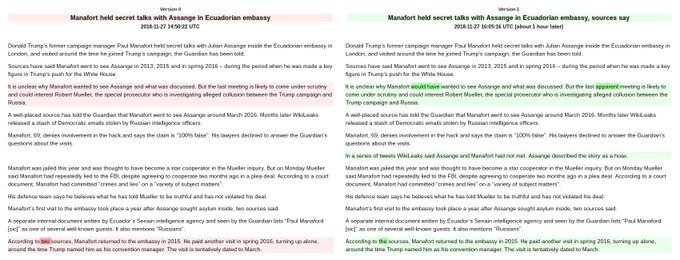We assert this claim based on the timing of the publication, the Guardian’s history of subservience to British intelligence agencies, animosity between The Guardian and WikiLeaks, and the longstanding personal feud between Guardian journalist Luke Harding and Assange. This conclusion is also supported by Harding’s financial and career interest in propping up the Russiagate narrative.
All eyes were on WikiLeaks this week, as lawyers argued for US charges against Assange to be unsealed. Hours before the (Clinton-appointed) judge in the case delaying their ruling for seven days, The Guardian lobbed an unexpected shot across the bow, claiming that: “Donald Trump’s former campaign manager Paul Manafort held secret talks with Julian Assange inside the Ecuadorian embassy in London, and visited around the time he joined Trump’s campaign.”
Disobedient Media recently reported on evidence indicating that charges against Assange do not relate to Russiagate. In light of this, one can immediately interpret the Guardian’s hit-piece as a distraction intended to tie public perception of Assange’s prosecution to the Russiagate narrative by any means necessary. Honesty be damned.
In the wake of the article’s publication, WikiLeaks and Paul Manafort have flat-out denied that any meeting ever took place between the former Trump campaign manager and the WikiLeaks co-founder. The Courage Foundation called the allegations “fabricated,” while members of Assange’s legal team strongly denied the allegations. WikiLeaks soon announced the creation of a Gofundme effort, raising funds to sue The Guardian for what it called an ‘entirely fabricated story.’
At the time of writing, The Guardian had already been observed modifying its claims, adding qualifiers to both the title of the article and the body of the text.
Journalist Ben Norton astutely observed the Guardian’s hasty editing, writing: “Some of the edits The Guardian has already made to its supposed Manafort-Assange scoop might look small but are significant: These weasel words like “would have,” “apparent,” and “might have” show the story is weak and relies entirely on anonymous sourcing.” WikiLeaks also observed the changes:
“Incredible: The Guardian is running an entirely bogus story as its front page headline just hours before US EDVA hearing on the unsealing of the Assange indictment. Dan Collyns and Luke Harding have been peddling entirely false Russia propaganda for months.”
Prior to yesterday’s hearing, the intelligence community of the UK and US were on the defensive foot, with numerous...
Read More HERE



No comments:
Post a Comment
Test Word Verification